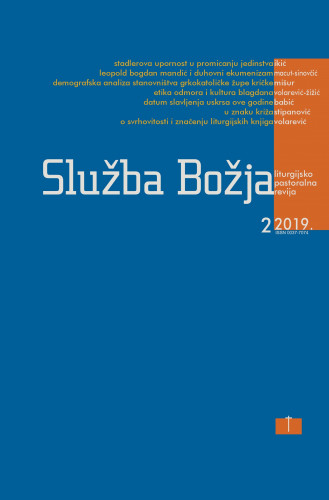U povodu stote obljetnice Stadlerove smrti (†1918.) autor se osvrće na ekumenski odnos prema pravoslavnima prvoga vrhbosanskog nadbiskupa. Autor uočava u njegovu vremenu mnoge vjetrove u prsa a ne u leđa, mnoge procese protivne radu, a ne u prilog njemu oko jedinstva Crkve, posebno u složenim crkvenim, nacionalnim i kulturnim prilikama u Bosni pri kraju 19. i početkom 20. stoljeća. Autor zapaža i ukazuje na veliku Stadlerovu upornost oko promicanja jedinstva Crkve i dokazuje njegova dva prilično različita pristupa istom pitanju. Prvi je tradicionalni skolastičko tridentski pristup do svoga imenovanja vrhbosanskim nadbiskupom i apostolskim promicateljem rada oko jedinstva Crkve, te drugi poslije svoga dolaska u Bosnu na zasadama ćirilo-metodske baštine. Povezano s drugim pristupom neki su Stadleru imputirali nijekanje vlastitoga crkvenog i nacionalnog identiteta, što autor pak argumentirano opovrgava.; On the occasion of the 100th anniversary of Stadler’s death, the author refers to the ecumenical attitude of the First Archbishop of Vrhbosna toward the Orthodox. The author perceives that in Stadler’s time many headwinds were blowing instead of tailwinds, that there were many processes opposed and not in favour of work about Church unity, especially in a complex church, national and cultural situation in Bosnia at the end of 19th and beginning of 20th century. The author also notices and points to great Stadler’s persistence in promoting the Church unity and proves his two quite different approaches to the same issue. The first is a traditional scholastic Trent approach, up to his appointment as Archbishop of Vrhbosna and apostolic promoter of work about Church unity; the other one, after his arrival in Bosnia, is based on the ideas of Cyril and Methodius heritage. Related to the latter approach, some have attributed to Stadler the denial of his own ecclesiastical and national identity, which the author argumentatively denies.
Sažetak

 Služba Božja : liturgijsko-pastoralna revija : 59,2(2019) / glavni i odgovorni urednik Ivan Macut.
Služba Božja : liturgijsko-pastoralna revija : 59,2(2019) / glavni i odgovorni urednik Ivan Macut.